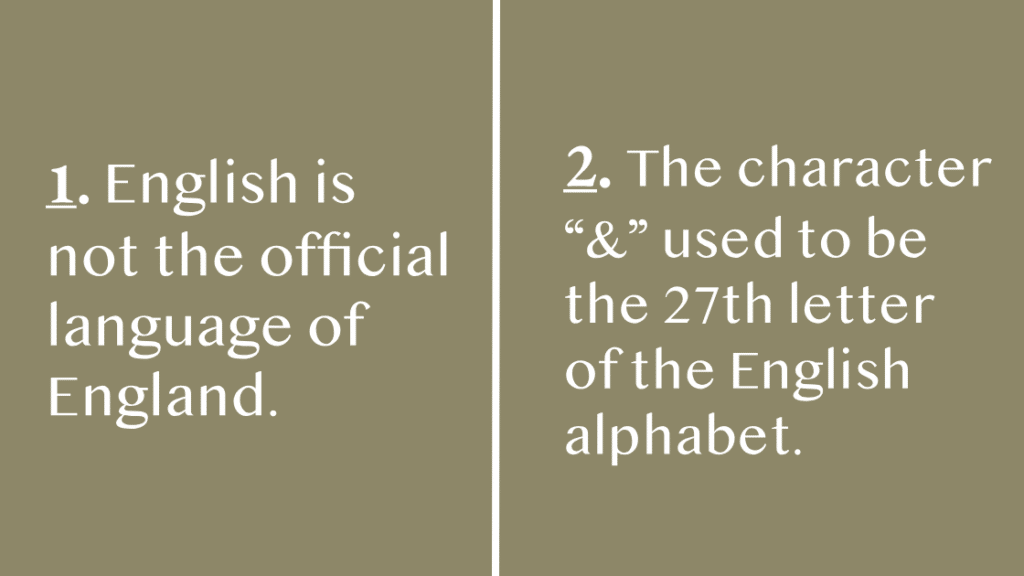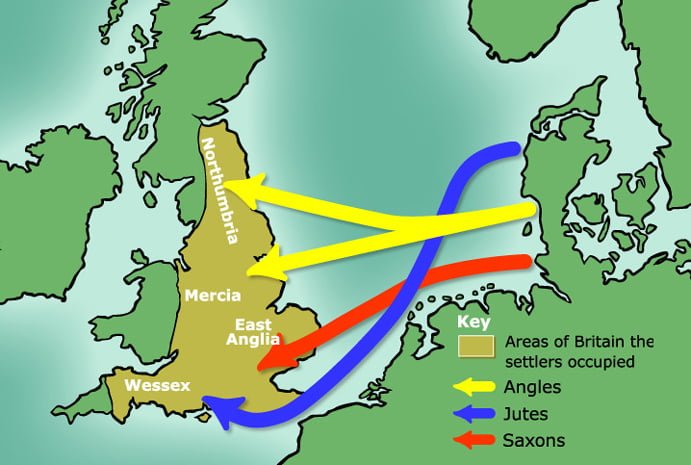No one disagrees that English is such a weird language. It has been the largest language to have been thoroughly studied, revealing more its peculiarities. Today, we brought some of the strangest facts that research has revealed about English. Aside from being a language where one drives in a parkway and parks in a driveway, recites in a play, and plays in a recital, here are some other facts about English:
1. English is not the official language of England.
You may find this odd or unbelievably ridiculous but it isn’t the language of the motto of the British Crown either, it is French: “[Mon] Dieu et mon Droit“….(“God and my Right”)…Look at the bottom of the picture below. Don’t believe everything

Source: Wikipedia
2. Ziph’s Law
You might have heard of this before, but if you haven’t, it’s your lucky day. It’s a simple concept and quite easy to get your head around. We all know what the most 20 common words are, right? Anyway here is a list:

Source: Wikipedia
If you look carefully at the numbers, a pattern immediately emerges. Pick up any written material, say a book or a newspaper. You will notice that the word

Neat, huh! Not only that. It appears that all languages follow this law, with no exception, including colangs like Esperanto. Therefore, pick up any piece of writing in any language and you will find that the common words occur irreversibly proportional to the rank in their frequency list. Mathematical patterns exist within us unknowingly.
3. Stress matters in English:
Here is a cool demonstration that shows what I’m talking about.
1. [I] never said she stole your money. (Someone else did)
2. I [never] said she stole your money. (never said that)
3. I never [said] she stole your money. (implied it in some other way)
4. I never said [she] stole your money. (she didn’t, someone else did)
5. I never said she [stole] your money. (maybe she borrowed it)
6. I never said she stole [your] money. (the money wasn’t yours)
7. I never said she stole your [money]. (she stole something else.)
Source: Reddit
The meaning changes completely based on the word you stress. So, if you are learning English as a second language, pay
4. Spelling/Pronunciation Madness:
Can you tell what’s the difference between photograph and photographer? It’s just the ‘-er’ in the second one, right? In writing yes, but in pronunciation a lot happened than just the ‘-er’. The rhythm, stress, and the overall pronunciation of the word completely changes, from “PHO-to-GRAPH” to “pho-TO-graph-er”. The same happens to many other words when they change their grammatical category, like biology/biological, super/superstition, etc. It’s madness I know! This is basically the reason that English spelling was never modified to match the pronunciation of words. You can imagine the chaos that would create.
5. The character “&” used to be the 27th letter of the English alphabet:
The & letter is called ampersand and used to be the last alphabet in English. Here is what English alphabets looked like, taken from

Source: Wikipedia
6. “Buffalo buffalo Buffalo buffalo buffalo buffalo Buffalo buffalo”
It would be strange if I said that this sentence made any sense at all. But in actuality it is perfectly grammatical in American English. But how? Okay, let me break it down for ya! This sentence is often used as a perfect example of homonymy in English, to give us a sense of how we can manipulate sounds to create very complicated constructs. Let’s see how is this sentence even grammatical.
According to Wikipedia:
The sentence is unpunctuated and uses three different readings of the word “buffalo”. In order of their first use, these are:
a. the city of Buffalo, New York, United States, which is used as a noun adjunct in the sentence and is followed by the animal;
n. the noun buffalo (American bison), an animal, in the plural (equivalent to “buffaloes” or “buffalos”), in order to avoid articles.
v. the verb “buffalo” meaning to outwit, confuse, deceive, intimidate, or baffle.
The sentence is syntactically ambiguous; however, one possible parse (marking each “buffalo” with its part of speech as shown above) would be as follows:
Buffaloa buffalon Buffaloa buffalon buffalov buffalov Buffaloa buffalon.
When grouped syntactically, this is equivalent to: [(Buffalonian bison) (Buffalonian bison intimidate)] intimidate (Buffalonian bison).
The sentence uses a restrictive clause, so there are no commas, nor is there the word “which,” as in, “Buffalo buffalo, which Buffalo buffalo buffalo, buffalo Buffalo buffalo.” This clause is also a reduced relative clause, so the word that, which could appear between the second and third words of the sentence, is omitted.
An expanded form of the sentence which preserves the original word order is: “Buffalo bison, that other Buffalo bison bully, also bully Buffalo bison.”
Thus, the parsed sentence reads as a claim that bison who are intimidated or bullied by bison are themselves intimidating or bullying bison (at least in the city of Buffalo – implicitly, Buffalo, New York):
Buffalo buffalo (the animals called “buffalo” from the city of Buffalo) [that] Buffalo buffalo buffalo (that the animals from the city bully) buffalo Buffalo buffalo (are bullying these animals from that city).- [Those] buffalo(es) from Buffalo [that are intimidated by] buffalo(es) from Buffalo intimidate buffalo(es) from Buffalo.
- Bison from Buffalo, New York, who are intimidated by other bison in their community, also happen to intimidate other bison in their community.
- The buffalo from Buffalo who are buffaloed by buffalo from Buffalo, buffalo (verb) other buffalo from Buffalo.
Buffalo buffalo (main clause subject) [that] Buffalo buffalo (subordinate clause subject) buffalo (subordinate clause verb) buffalo (main clause verb) Buffalo buffalo (main clause direct object).- [Buffalo from Buffalo] that [buffalo from Buffalo] buffalo, also buffalo [buffalo from Buffalo].
When we parse the sentence, we will get something like this:

Source: Wikipedia






